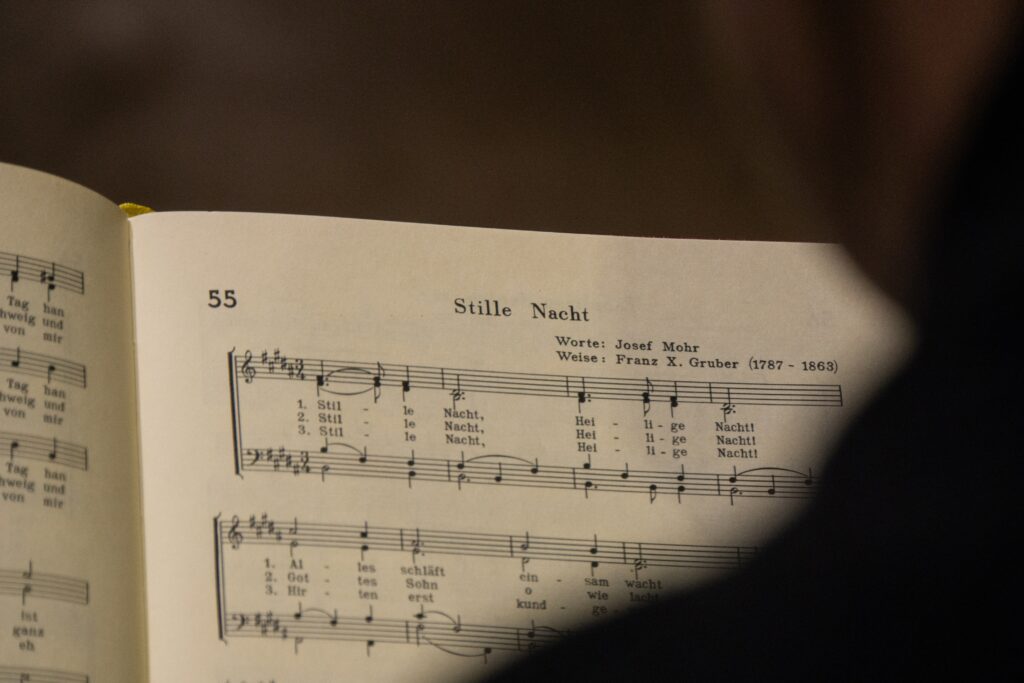Speaking of Life 3011 | Loving Us Without Walking Away
We have all experienced situations that have not gone our way. President Greg Wiliams reminds us that, the never-ending love of God meets us in our weariness.
Speaking of Life 3011 | Loving Us Without Walking Away
Greg Williams
This is one of my favorite pictures. It hangs in my office and I see it every day. My son Gatlin was playing college football, and this is a post-game scene.
Gatlin played the position of linebacker and his primary role was to shut down the opponent’s ability to run the ball in the middle of the field. That afternoon the game wasn’t shaping up like we were hoping for. In particular, the other teams running backs were coming through the middle and breaking off long runs. It was as if the other team was reading our playbook. The bad news is that all afternoon they exploited the part of the field Gatlin was defending and our team suffered a decisive loss.
In this moment captured by the picture, my wife Susan walked alongside my boy in silence. She held that moment for him, saying nothing, just loving him without walking away. The picture reminds me of a passage in Isaiah.
He gives power to the faint, and to him who has no might he increases strength. Even youths shall faint and be weary, and young men shall fall exhausted; but they who wait for the Lord shall renew their strength; they shall mount up with wings like eagles; they shall run and not be weary; they shall walk and not faint. Isaiah 40:29-31 (ESV)
Perhaps the reason for this verse’s popularity is the weariness we can all identify with. Weariness of lost games and lost relationships, weariness of our own failures and the failures of those we love—fatigue in a fallen world.
That’s why this picture means so much to me. It’s my son having that existential experience of failure and his mother reaching out to stand up with dignity and grace beside him.
The Williams boys have their share of trophies and ribbons and championship rings—we did all that. But this picture is my favorite.
This is the tangible, never-ending love of God we meet in our weariness. Of Jesus—God with us—who not only experienced death but all the frustrations and the “nothing-to-say” disappointments of life as well.
Jesus never sinned, but he knew what it was like to have things go wrong. He had to learn to be a carpenter by way of hammered thumbs and uneven tables. Do we think of him that way? Do we think of him walking off the proverbial field with Mary by his side simply staying close?
He walks beside us. He suffers with us. He gives power to the faint and reminds us that love, joy, and grace—not defeat—will have the final word.
I am Greg Williams, Speaking of Life and reminding you that you never walk alone.
Psalm 147:1-11, 20c • Isaiah 40:21-31 • 1 Corinthians 9:16-23 • Mark 1:29-39
The theme this week is God’s great care. The call to worship Psalm tells us of God’s tenderness toward Israel through the centuries, and also his loving care for the natural world. Isaiah 40 gives us a vivid poem about God’s greatness and power, and then provides a tender image of him lifting up those who wait in him. Mark 1 gives us a touching story of Jesus taking gentle care of an elderly person and others who might have easily been overlooked in that society, and ours. Our sermon comes from 1 Corinthians 9, part of a longer discussion in which Paul calls us to reach out with God’s great care, putting relationships before our personal rights and preferences.
Paul and the Main Thing
1 Corinthians 9:16-23 ESV
Begin with reading for this week: 1 Corinthians 9:16-23 ESV.
The main thing is to keep the main thing the main thing.
It’s the kind of aphorism you might see in your grandpa’s workshop or on grandma’s cross stitch sampler. Put your mind and energy into what matters most; don’t let the unnecessary take up all the oxygen in the room.
When you need a car, color doesn’t matter. When you need a job, the premium corner office may have to wait. The person you fall in love with is shorter/taller/wider/louder than you always imagined—who cares?
At the church level—hymns or modern worship, videos or PowerPoint, liturgy or spontaneous praise, written prayers or impromptu prayers, drums or no drums, wine or sparkling cider—these conversations have gone on forever—pretty much since the start of the church.

In this letter to believers in Corinth, Paul was trying to get the church to keep the main thing—the gospel—the main thing. He found himself right in the middle of a paradigm shift in the way God was relating to humanity. The summation of the rituals and practices of the Israelites—held faithfully for thousands of years—had served their purpose. There was understandable tension in making a change, and that’s what we’ll explore today. Let’s consider this seemingly minor but powerfully symbolic discussion in this corner of 1 Corinthians.
Let’s look at this—like the old shorthand way of summarizing school lessons—as a matter of three R’s.
- Rituals
- Rights
- Relationships
Rituals
As Christians, we tend to underestimate and misunderstand how influenced we are by our Israelite (primarily Jewish) heritage. There is an important bit of theological and historical context we need for this section of 1 Corinthians to make the most sense to us.
Paul uses the word “law” throughout his letters. Often what he refers to is the distinctive practices of Judaism—strict Sabbath-keeping, dietary restrictions, circumcision, and a strong sense of the ethnic Hebrew lineage. There were many rituals and identifiers given to Israel by God to show their distinction.
These ritual laws worked in conjunction with moral/ethical laws to form Israel’s identity as God’s people. There was nothing trivial about these practices in the Jewish mind. Only a few generations earlier, the Jewish people had been brutally persecuted for keeping them. Their great grandparents had been killed and tortured for insisting on Sabbath and circumcision. For a somewhat transient and occupied Israel, cultural practices held their identity together.
Along comes Paul and company to say these practices are no longer necessary. The gospel message declared faith in Christ as the connection with God, stating that Jesus fulfilled all these signs of his coming. They taught that the moral and ethical law is still in place, but to keep the ritual law after the coming of Christ is like wearing your wedding dress after you’re already married.
We need to be sympathetic to how important these rituals were to Paul’s audience. Add to this that the early church was a patchwork of Jews and Greeks—two cultures that could not be more different and often had difficulty communicating.
One of Paul’s consistent pastoral issues was that Jewish believers wanted to add old practices to what it meant to be a Christian. Yes, you believe in Christ but you also have to get circumcised or, in this section here, avoid meat served to idols. Paul emphatically says no, the main thing and the only thing is a relationship with Christ through faith.
A consistent pastoral issue with the Greek community was their casual worship of other gods—they might have a whole cadre of gods and goddesses they worshipped, and they were ready to give Jesus a place on the shelf. To which Paul says: No, clear the shelf, Jesus should be the only one worshipped.
Greco-Roman culture also had a relaxed sexual ethic compared to the Jewish and Christian standard. Paul encouraged them to live out their new identity by the power of the Spirit in a healthy and pure sexuality.
All these intense pressures are at work here in Corinth—a port city of several different cultures known widely as a licentious and fast-living place. There is also a long-embedded, distinct Jewish community living within all this.
The discussion in this section of the letter concerns a common practice in Corinthian culture—eating food offered to idols. The regular practice was to eat in the temple as an act of worship to the pagan gods. You burned part of your meal in front of the idol as an offering and ate the rest of it in its presence as worship and allegiance. But there was always too much meat, and this became a source of income for the priests. They sold the remaining meat back to the community.
Jewish citizens, as a safeguard against involvement with the idols, avoided food offered to idols. This became a mark of Jewish identity. Paul tells them that such things aren’t important anymore. The idol has no power, or even existence, and the meat is simply meat.
This becomes an issue, understandably, for those of Jewish heritage. Paul’s reiterated message to them is that those who are in Christ—not those who follow certain practices—are the people of God now.
Rights
Am I not an apostle?!
This emphatic question comes in a discussion Paul has through his writing. The thumbnail-sketch background of this is that orators and teachers like Paul were routinely paid for their services by their followers.
Paul talks often in this section about preaching the gospel “free of charge” among them—meaning that he has not imposed his rights as a teacher. Rights are a huge discussion for Paul—this or that is my “right”— but he maintains that he would immediately put his “rights” aside if any right got in the way of the gospel. My rights do not matter that much.
The issue with some in the Corinthian community was that they were flaunting their right as free children of God in this practice of eating food offered to idols. In their joy in freedom from old restrictions, they were indulging their rights in a way that hurt the community.
The Corinthian community was obsessed with being the most spiritual and the most knowledgeable, to the point that the community was splintered. Paul’s letter starts out spoofing their divisions:
What I mean is that each one of you says, “I follow Paul,” or “I follow Apollos,” or “I follow Cephas,” or “I follow Christ.” Is Christ divided? Was Paul crucified for you? Or were you baptized in the name of Paul? (1 Corinthians 1:12-13 ESV)
Whether it’s new Greco-Roman believers flaunting their freedom or Jewish believers clinging to the past, the name of the game was division. And Paul says that is the main problem, and the way to fix that is the main thing.
Or, as he said it, “Now I will show you the most excellent way…” and he follows that with a brief essay on love (1 Corinthians 12:31-13:13).
Relationships
For though I am free from all, I have made myself a servant to all, that I might win more of them. To the Jews I became as a Jew, in order to win Jews. To those under the law I became as one under the law (though not being myself under the law) that I might win those under the law. To those outside the law I became as one outside the law (not being outside the law of God but under the law of Christ) that I might win those outside the law. To the weak I became weak, that I might win the weak. (1 Corinthians 9:19-22 ESV)
Here’s where the discussion has taken us. There’s an issue in the church with Christians eating food offered to idols. Some want to hold to tradition and others think they have a corner on what Christian freedom means.
Paul says, “You’re both wrong.” First of all—eating food offered to idols is irrelevant. The association doesn’t matter. On the other hand, you also have to be careful when practicing your freedom from this obsolete cultural requirement.
Here’s where Paul lays down an example. The problem was not the meat itself, but the worship ritual it was used in. Christians were sternly forbidden from taking part in this worship and Paul has strong words for it later.
So, if you are eating said meat around believers who are solidly strong in their faith, that’s fine. If one of them has an issue with it, they need to re-evaluate what “saved by grace through faith” means (tell this truth in love of course).
However, if you are eating this meat in front of a new or on-the-fence believer, that’s a problem. They can be tempted to go back to those pagan temple rituals or even put themselves back there mentally and emotionally, causing spiritual damage.
Your so-called “right” to freedom in Christ isn’t worth that.
As Paul says elsewhere:
Therefore, if food makes my brother stumble, I will never eat meat, lest I make my brother stumble. (1 Corinthians 8:13 ESV)
He will never eat meat again if it causes his brother or sister to stumble back into their old life. That’s love. He doesn’t want to nudge anyone even an inch in a wrong direction.
The guiding principle here is relationship. It’s not your obsolete rituals, it’s not your rights to Christian freedom. Relationships in the family of God are the determining factor and the only one worth preserving.
“To the weak, I became weak…” The weak are the people who may slip back into the old life if they are still learning how to live in their Christian freedom.
The old ritual and the old accretions to the law, like the idol-food prohibition, are not relevant anymore. We are free in Christ. Paul says you can take or leave these things, even practicing old rituals if it might help clear the way between someone and Christ. He concludes this passage as follows:
I have become all things to all people, that by all means I might save some. I do it all for the sake of the gospel, that I may share with them in its blessings. (1 Corinthians 9:22-23 ESV)
Paul would even respectfully take on the obsolete practices if he was ministering to the Jewish community. Just as quickly, he would drop such practices if he was ministering to the non-Jewish community. His identity is in Christ, and which meat he ate or days he practiced doesn’t affect that one way or the other.
But here we are in the 21st century. In Western nations, it’s rare that we will run into an issue of eating meat offered to idols!
But the principle comes through, which is why the Holy Spirit has given us this passage.
Examples:
- You are free to wisely drink alcohol; it’s not a theological issue. But if someone joins your table who is only one week sober, you should have your beer another time. Your relationship with that person and their relationship with God is more important than your choice of beverage. It’s always a good idea to avoid alcohol unless you already know the other person is OK with it.
- A new believer catches a ride with you. You are best to turn off your radio and join in a conversation. You may like heavy metal music, but what if your brother just came out of a lifestyle in which this music accompanied drug use, sexual irresponsibility and violence. Your music can raise questions he may not be ready to ask. Your brother’s spiritual health matters more than your right to pick the tunes. Ask him what type of music he prefers before turning on your radio.
- At least in the U.S., it looks like this. One sister is a Democrat, one is a Republican. They’ve both carefully and prayerfully made their political choices and ended up at different destinations. They disagree, no doubt, but they must never believe the other to be less spiritual or mature in Christ. Theologically, political affiliation itself is a matter of indifference. {Fit this for your context}
- A young brother considers hymns to be outdated and irrelevant and “dead.” An older brother grew up on the classics, and he thinks new praise choruses are distracting and obnoxious. They create a blended service of worship and gradually come to appreciate—even worship through—each other’s musical choices. The tempo of the music doesn’t matter, the relationship between these brothers matters.
The main thing is to keep the main thing the main thing. The main thing is the gospel; the main thing is the supernatural love between brothers and sisters. While Paul’s main point here was “so that he might win some”, he never compromised the gospel. He does not say to preach what others want to hear, or to move from grace back to focusing on the law, his point is to start by meeting people where they are in order to bring them forward to a relationship with Jesus.
There’s a great old quote from American history: “My right to swing ends where the person’s nose begins.” If your freedom in Christ is causing a brother or sister spiritual damage, then it’s not worth it. On the other hand, if you make what works for you spiritually (Christian music, abstinence from alcohol, etc.) a litmus test of someone else’s faith, then you’ve also missed the point.
It’s a tall order; our categorizing brains don’t like it. But this is what God has called us to. Don’t exclude a brother/sister, and don’t cause them to stumble either.
Keep the main thing the main thing.
From Speaking of Life: “Love Us Without Walking Away”
- Greg shared a picture of his wife Susan walking with their son after his team had just lost a big game. Can you think of a time when someone walked alongside you and supported you after a big loss—maybe without even saying a word?
- Do you feel like God walks with us this way sometimes? That he meets us in our weariness as well as in our strength?
From the sermon:
Begin with the reading for this week: 1 Corinthians 9:16-23
- “The main thing is to keep the main thing the main thing”—have you ever heard this proverb before? Does it resonate with you? Why is it difficult?
- Paul talks about how our relationship with each us other as brothers and sisters in Christ is more important than our real or perceived “right” to act in a certain way. In a sense, we give up many of our rights in relationships—why do you think that is? Have you seen the power of giving up your personal rights in a relationship, whether marriage, parenting, in the church, or elsewhere?
- We talked about rituals in church, like how we baptize or do a worship service or take communion. Why do you think this has divided the church? How can we better maintain unity in diversity?
Quote to ponder: “My right to swing my fist ends just where another person’s nose begins.” ~~Oliver Wendell Holmes



 By Randy Bloom, GCI Board Vice Chair
By Randy Bloom, GCI Board Vice Chair
 By Bill Hall, National Director, Canada
By Bill Hall, National Director, Canada
 By Heber Ticas, Superintendent of South America
By Heber Ticas, Superintendent of South America
 By Tim Sitterley, U.S. Regional Director West
By Tim Sitterley, U.S. Regional Director West


 something to teach us? It is true that children are the future. However, if we follow Jesus’ example, we will see that children are the now.
something to teach us? It is true that children are the future. However, if we follow Jesus’ example, we will see that children are the now.
 “I like the fresh expression of using the term connect group. Because it makes you think, ‘How is this going to be different than what we’ve done in the past?’. Because in the past…a lot of times when we would think about a small group, we would think the pastor is coming to give Bible Study with a group of 8 or 10 people. A connect group is not really about the pastor giving another Bible Study to a small group of people. In fact, I hope for a lot of our pastors they don’t really have to facilitate connect groups. I hope they can participate and be ministered to as well through their participation.”
“I like the fresh expression of using the term connect group. Because it makes you think, ‘How is this going to be different than what we’ve done in the past?’. Because in the past…a lot of times when we would think about a small group, we would think the pastor is coming to give Bible Study with a group of 8 or 10 people. A connect group is not really about the pastor giving another Bible Study to a small group of people. In fact, I hope for a lot of our pastors they don’t really have to facilitate connect groups. I hope they can participate and be ministered to as well through their participation.”


